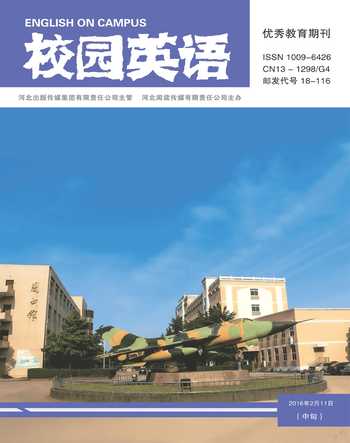On C—E Translation from Skopostheorie Taking scenic—spots couplets as examples
2016-05-30吴汨平曾亚平
吴汨平 曾亚平
【Abstract】Chinese national culture needs to be further opened to the world with the development of the “One Belt One Road”. Taking scenic spots couplets for examples, we discusses the theoretical guidance of skopostheorie in translation and strategies of translating scenic spots couplets, hoping to provide translators with some new references and inspiration in the couplet translation from a new comprehensive view.
【Key words】Skopostheorie; scenic-spots couplets; translation
Translation consists in reproducing in the receptor language the closest natural equivalent of the source language message, first in terms of meaning and secondly in terms of style. The paper expounds the translation and strategies of translating scenic spots couplets under the guidance of skopostheorie.
1. Introduction to skopostheorie
Skopostheorie,which was founded by Hans J.Vermeer in the late 1970s is the core content of German Functionalist Theory. There are three principals of skopos theory: skopos rule, coherence rule and fidelity rule. Fidelity rule usually complies with coherence rule. Both of fidelity rule and coherence rule should comply with skopos rule. Fidelity rule is based on coherence rule, and skopos rule is the central principal which we should obey firstly.
2. Definition of scenic-spots couplets
“Couplet, as a unique Chinese literary genre, is a Chinese antithetical couplet written and mounted on a pair of scrolls to be hung up on a pillar or wall for various ceremonies or celebrations.” For example, “杜诗范记高千古,山色湖光共此樓(The poem of Dufu and the narration of Fan Zhongyan about Yueyang tower have been widely read for thousands of years; The beauty of the mountain surrounded and the splendor of the lake can be both enjoyed on Yueyang Tower)”.Scenic-spots couplets may serve as a window to Chinese national culture.
3.Analysis of scenic-spot couplets translation from skopostheorie
The book Preliminaries to Chinese Antithetical Couplets and Their Translation into English written by Professor Huang Zhongxi holds skopostheorie should be used in the scenic –spots C-E translation.
3.1 Analysis of scenic-spot couplets translation from skopos rule perspective
We found there are many antithetical couplets related to educating in many cultural scenic-spots. For example, the couplet“惟楚有才,于斯为盛” in Hunan Yuelu Academy. The word“惟”wherein is a auxiliary word of tone without any meanings. “楚” is one of seven states in the Warring States Period and it generally refers to Hunan provincce. “于斯” means “Here”. The antithetical couplet links coherently the first line with the second line.
Its easy to understand for Chinese people. But the skopos of scenic-spot couplet translation is cross-culture exchange. If “楚”is directly translated to “Chu State”, It is difficult to understand for foreign tourist who knows a little about Chinese culture. Readers are made to understand that this antithetical couplet is written for praising Hunan--a cradle of producing great men as well as Yuelu Academy. So “楚” is translated to “Hunan Province” which refers to the same country as “Chu State”. The reference which can achieve the skopos of scenic spot couplet is as: Hunan province breeds many talents; The Yuelu Academy cultivates them most.
3.2 Analysis of scenic-spot couplets translation from coherence rule perspective
Vermeer insisits translation should follow the coherence rules not only within the language but also cross-linguistic. “金声玉振,虎跃龙腾”. This antithetical couplet hung in Shixizhai of Hunan University means a high praise for the Alma Mater and if the literal translation were applied, the passing tourists would probably feel confused due to the difference of Chinese and Western cultural background. Coherence rule is manifested not only by the sentence pattern, the word class but by the achievement of the goal ,the core or the purpose of the text. According to the meaning and the sentence pattern of this antithetical couplet, the first line has the meaning of the long standing reputation and a wide spread of the Academy; the second line carries the meaning of Alma Mater of Hunan University with good academic atmosphere and lavishes many academic activities. The reference below is acceptable:Great reputations of the Yuelu Academy spread far and wide; Alma Mater takes on prosperous academic activities.
Due to this papers limitations, there is still room for further discussion and improvement, contributing to a better couplet translation and a wider spread of Chinese culture in the world.
杂志排行
校园英语·中旬的其它文章
- Doubting Altruism: Altruism or Self Interest
- A Design of RFID Antenna based on Left—hand Material
- Two Female Prime Ministers Margaret Thatcher and Julia Gillard
- A Critical Review on Bacon’s Attitudes towards Women
- A simple analysis on the Bretton woods system
- Cigarette use, Cigarette Consumption and Price of Cigarette
